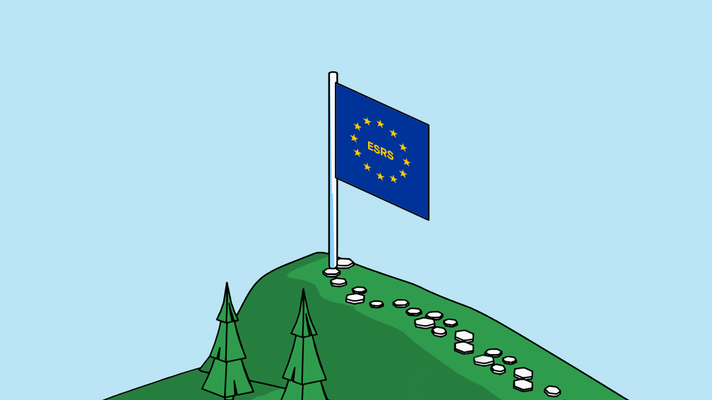What is the Corporate Sustainability Due Diligence Directive?

- Category
- Climate Essentials
- Topics
- Regulations
- Published
- 06 June 2024
Contents
- What is the aim of the CSDDD?
- What are the human rights and environmental impacts covered?
- Which businesses are covered?
- What is the timeline for adoption?
- How does the CSDDD relate to the CSRD?
- How can you prepare your business for the CSDDD?
- 1. Explore business relationships
- 2. Update and refine policies
- 3. Embrace a risk management approach
- 4. Facilitate a responsive complaints procedure
- 5. Document and communicate your initiatives
- What are the consequences for non-compliant companies?
We walk you through what businesses need to know about the CSDDD regulation.
On May 24, 2024, the European Council and European Parliament officially adopted the EU Corporate Sustainability Due Diligence Directive (CSDDD). This directive imposes obligations on large companies to address the adverse impacts of their activities on human rights and environmental protection, along with specifying the associated liabilities. These rules apply not only to the companies' own operations but also extend to the activities of their subsidiaries and business partners throughout their value chains.
What is the aim of the CSDDD?
The aim of the EU's Corporate Sustainability Due Diligence Directive (CSDDD) is to enhance the protection of human rights and the environment. It requires in scope companies to identify, prevent, mitigate, and address adverse impacts on human rights and the environment caused by their operations, subsidiaries, and business partners. This directive helps minimize negative impacts on people and the planet while enabling companies to manage risks across their entire supply chain.
The CSDDD is part of the European Green Deal, which aims to reduce the EU's greenhouse gas emissions by at least 55% by 2030 and achieve climate neutrality by 2050. It works alongside other regulations such as the Corporate Sustainability Reporting Directive (CSRD) and the EU Taxonomy Regulation, furthering sustainable business practices under a unified European framework.
By standardizing due diligence regulations across the EU, the CSDDD harmonizes legal requirements, reducing uncertainty and fostering sustainable practices uniformly across Europe.
What are the human rights and environmental impacts covered?
The Corporate Sustainability Due Diligence Directive (CSDDD) addresses a specific set of human rights and environmental impacts aligned with key international standards. For human rights, it covers a range of labor rights, such as the prohibition of child labor, forced labor, and discrimination, as well as the rights to freedom of thought, conscience, religion, association, assembly, and collective bargaining. While freedom of expression is not explicitly listed, it would likely be included in the due diligence scope for media organizations.
On the environmental front, the CSDDD includes violations related to the handling, collection, storage, and disposal of waste, and the use of biological resources affecting biodiversity. The CSDDD is the first piece of EU legislation mandating companies to adopt a climate transition plan.
In-scope companies must commit to ensuring their business models are compatible with the transition to a sustainable economy and to limiting global warming to 1.5°C, in line with the Paris Agreement. They should also incorporate emissions reduction objectives if climate risks are significant to their operations.
Which businesses are covered?
EU Companies which:
Have more than 1,000 employees on average and a net worldwide turnover exceeding EUR 450 million.
Are the ultimate parent companies of a group meeting the above criteria.
Have ntered into franchising or licensing agreements in the EU where royalties exceed EUR 22.5 million, provided that the company or group had a net worldwide turnover exceeding EUR 80 million.
Non-EU Companies which:
Have generated a net turnover in the EU exceeding EUR 450 million.
Are the ultimate parent company of a group meeting the above criteria.
Have entered into franchising or licensing agreements in the EU where royalties exceed EUR 22.5 million, provided that the company or group had a net turnover exceeding EUR 80 million in the EU.
Note: SMEs are not directly in scope but may be affected as contractors or subcontractors to any of the above companies.
What is the timeline for adoption?
2024-2026: EU member states will incorporate the CSDDD into their national law.
2026-2027: The CSDDD becomes enforceable at the national level.
Starting 2027: Compliance is required for companies with more than 5,000 employees and a net annual turnover exceeding EUR 1.5 billion.
Starting 2028: Compliance is required for companies with more than 3,000 employees and a net turnover exceeding EUR 900 million.
Starting 2029: Compliance is required for companies with more than 1,000 employees and a net turnover exceeding EUR 450 million.
How does the CSDDD relate to the CSRD?
The Corporate Sustainability Due Diligence Directive (CSDDD) acts as a toolkit for both EU and non EU companies to fulfill environmental and human rights duties, complementing the Corporate Sustainability Reporting Directive (CSRD)'s sustainability reporting requirements. This integration allows companies to present a comprehensive view of their sustainability and responsibility efforts.
For more information about the CSRD and how to prepare, take a look at our dedicated resource.

How can you prepare your business for the CSDDD?
Complying with the CSDDD doesn't have to be complicated. Here's our 5 step approach.
1. Explore business relationships
To comply with the CSDDD, it's vital to map out your entire value chain, including subsidiaries and indirect business connections. This involves understanding both upstream and downstream relationships, such as suppliers and customers, to identify and mitigate potential human and environmental rights violations.
While initially challenging, you can kickstart this process by gathering information through questionnaires and introducing contractual clauses for new suppliers to verify their supply chains. These steps foster accountability and compliance, aiding you in navigating the complexities of your business relationships effectively.
2. Update and refine policies
Integrating due diligence into your corporate policies and codes of conduct is essential under the CSDDD. You'll need to revise existing policies to align with these requirements, potentially including amendments to employment and supplier contracts.
Proper training of employees and partners on these new policies is crucial for effective implementation across your organization.
3. Embrace a risk management approach
Identifying actual and potential adverse impacts requires a robust risk management system. You must consider broad factors such as geopolitical conflicts, pandemics, and climate change.
Investing in experienced providers for compliance, vendor risk, and integrated risk management can help you navigate these complexities effectively, ensuring that your business operations remain compliant and resilient.
4. Facilitate a responsive complaints procedure
A comprehensive complaints procedure, open to your business partners' operations, is mandated by the CSDDD. You'll need to enhance your existing whistleblowing procedures to incorporate information gathering mechanisms and address concerns effectively. This ensures transparency and accountability throughout your organization.
5. Document and communicate your initiatives
Under the CSDDD, you're required to publish an annual report detailing your sustainability efforts transparently. Documenting decisions and actions is crucial for accountability, compliance, and defending against potential challenges.
Keeping accurate records facilitates your response to requests, complaints, and regulatory inquiries, ensuring transparency and legal preparedness across your organization.
What are the consequences for non-compliant companies?
The Directive requires Member States to appoint independent "supervisory authorities" to ensure compliance with the CSDDD. These authorities must have sufficient power and resources, including the ability to request information and conduct investigations. Investigations can be initiated by the authorities themselves or based on concerns raised by third parties.
These authorities governing the civil liability of companies are empowered to:
Order companies to stop any violations and take corrective actions.
Impose penalties.
Take interim measures if there's a risk of severe harm.
Sanctions imposed by Member States must be effective, proportionate, and discouraging. They may include fines of up to 5% of the company's worldwide net turnover. Any civil liability penalties imposed must be made public, available for at least five years, and shared with the European Network of Supervisory Authorities to publicly identify non-compliant companies.
In addition to these penalties, compliance with the CSDDD's obligations can influence the awarding of public contracts.
How can Sweep help with the CSDDD?
Develop and monitor climate transition plans efficiently to avoid penalties and mitigate identified risks.
Automate carbon emissions data management for swift compliance.
Engage all partners seamlessly for accelerated decarbonization.
Identify emissions hotspots and allocate resources effectively.
Use expert questionnaires for streamlined compliance and improved partnerships.
Find out more today.
More stories
Track, report and act
Sweep helps you get your carbon on-track
Sign up to The Cleanup, our monthly climate newsletter


© Sweep 2024


